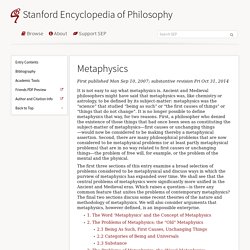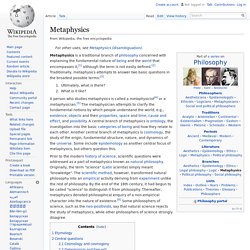

Ontology in Wikipedia. Study of the nature of being, becoming, existence or reality, as well as the basic categories of being and their relations Parmenides was among the first to propose an ontological characterization of the fundamental nature of reality.

Etymology[edit] While the etymology is Greek, the oldest extant record of the word itself, the New Latin form ontologia, appeared in 1606 in the work Ogdoas Scholastica by Jacob Lorhard (Lorhardus) and in 1613 in the Lexicon philosophicum by Rudolf Göckel (Goclenius). The first occurrence in English of ontology as recorded by the OED (Oxford English Dictionary, online edition, 2008) came in a work by Gideon Harvey (1636/7–1702): Archelogia philosophica nova; or, New principles of Philosophy.
Leibniz is the only one of the great philosophers of the 17th century to have used the term ontology.[6] Overview[edit] Some fundamental questions[edit] Principal questions of ontology include:[citation needed] Concepts[edit] Types[edit] History[edit] Hindu philosophy[edit] Metaphysics. 1.

The Word ‘Metaphysics’ and the Concept of Metaphysics The word ‘metaphysics’ is notoriously hard to define. Twentieth-century coinages like ‘meta-language’ and ‘metaphilosophy’ encourage the impression that metaphysics is a study that somehow “goes beyond” physics, a study devoted to matters that transcend the mundane concerns of Newton and Einstein and Heisenberg. This impression is mistaken. The word ‘metaphysics’ is derived from a collective title of the fourteen books by Aristotle that we currently think of as making up Aristotle's Metaphysics.
This is the probable meaning of the title because Metaphysics is about things that do not change. Should we assume that ‘metaphysics’ is a name for that “science” which is the subject-matter of Aristotle's Metaphysics? The subject-matter of metaphysics is “being as such” The subject-matter of metaphysics is the first causes of things The subject-matter of metaphysics is that which does not change 2. 2.2 Categories of Being and Universals 3. Metaphysics in Wikipedia. Metaphysics is a traditional branch of philosophy concerned with explaining the fundamental nature of being and the world that encompasses it,[1] although the term is not easily defined.[2] Traditionally, metaphysics attempts to answer two basic questions in the broadest possible terms:[3] Ultimately, what is there?

What is it like? Prior to the modern history of science, scientific questions were addressed as a part of metaphysics known as natural philosophy. Originally, the term "science" (Latin scientia) simply meant "knowledge". The scientific method, however, transformed natural philosophy into an empirical activity deriving from experiment unlike the rest of philosophy. Etymology[edit] However, once the name was given, the commentators sought to find intrinsic reasons for its appropriateness.
Central questions[edit] Cosmology and cosmogony[edit] Metaphysical Cosmology is the branch of metaphysics that deals with the world as the totality of all phenomena in space and time.